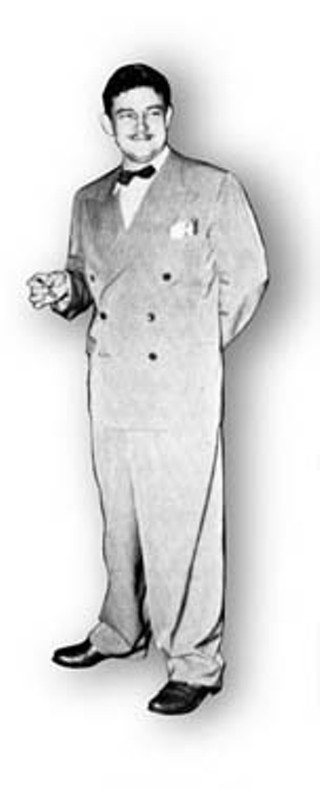Christmas in July, Sullivan's Travels (1942), The Palm Beach Story
Christmas in July, Sullivan's Travels (1942), The Palm Beach Story
Reviewed by Jerry Renshaw, Fri., March 16, 2001

In the Forties, Preston Sturges wrote and directed a string of comedies that wound up being some of the sharpest, funniest movies of the time. Watching a string of Sturges' films reveals common threads between them; the director used the same ensemble of character actors for each movie (Franklin Pangborn, Ernest Truex, Esther Howard, William Demarest, Raymond Walburn). His dialogue smacks of Thirties screwball comedies, except with a greater appeal to intellect and the occasional line out of left field. Even the so-so Beautiful Blonde of Bashful Bend has Betty Grable's uncle instructing her in marksmanship by telling her, "Just squeeze the trigger gently, like you're squeezing a sock full of dead mice." Sturges' actors stretch out in incredibly long takes with the dialogue rattling away, a feat that would have been near impossible for a director less deft than Sturges. His physical comedy segments are often surreal and as out of place as a musical number in a war movie. Most of all, though, his movies were deeply humane, with engaging characters and a sympathetic eye toward their follies.
CHRISTMAS IN JULY
D: Preston Sturges (1940); with Dick Powell, William Demarest, Franklin Pangborn, Raymond Walburn, Ellen Drew.
"If you can't sleep at night, it's not the coffee -- it's the bunk!" Maxford House Coffee is offering a sizable cash prize for the person who can come up with their new slogan. Accounting drone Johnny (Powell) offered up the above asinine phrase (trading on a "scientific" finding that coffee helps promote sleep), hoping against hope that the company will bite. His engagement to his girlfriend Betty (Drew) is going nowhere, what with Johnny's pittance of a salary. The contest is
logjammed, however, with one holdout on the jury (Demarest, of course) keeping things in suspense. As a prank, Johnny's co-workers compose a fake telegram to give Johnny, informing him as the winner. The prank backfires when he gets the prize money and his life is instantly turned upside down. Johnny and Betty make plans to get married immediately and begin buying presents for all their friends, relatives, and neighbors. Johnny's moved up in the company, from the accounting pool to the ad department, but in time the hoax is exposed and the consequences come crashing down on his head. Sturges' second directorial effort is a breezy 67 minutes, giving Johnny and Betty some real depth and inviting the audience to like them without ever giving them a cloying Capra-esque feel. As fine as Powell and Drew are, Demarest and Pangborn are also in top form in this often-hysterical comedy.
SULLIVAN'S TRAVELS (1942)
D: Preston Sturges (1942); with Joel McRae, Veronica Lake, William Demarest.
Two men struggle with each other atop a moving boxcar. They fall between the cars, and in their battle to the death, the two fall from the train as it goes across a trestle and plunge together into a river. This bewildering segment ends director John Sullivan's epic O Brother Where Art Thou? and begins Sturges' Sullivan's Travels. Joel McRae plays Sullivan, a successful, idealistic director who's tired of working on escapist fare like Hey Hey in the Hayloft and Ants in Your Pants of 1939. Instead, he's aflame with the desire to make a Grand Statement in a film, one that will be a "true canvas of the suffering of mankind (but with a little sex in it)." To that point, the grapplers from O Brother are named Labor and Capital. Determined to see his film through, Sullivan turns his back on Hollywood, scrounges some old clothes from the studio's costume department and hits the road to experience hardship firsthand. With his scant belongings bundled in a bandanna on the end of a stick, at first, he is trailed by a whole entourage traveling in a bus as he trudges down the highway. A ride from a 13-year-old kid in a hotrod jalopy results in a wild chase involving the jalopy, the bus, and a motorcycle cop (for one of those Sturges physical-comedy non sequiturs). Sullivan ditches his entourage and rides the rails, only to wind up back in Hollywood, where he meets the Girl (Lake), a disillusioned would-be actress. The two cast their fortunes together and ride the rails again, where Sullivan's search for trouble bears fruit and the movie takes a sudden, serious turn. Somehow the movie's slapstick and seriousness, comedy and commentary, meld together seamlessly. Veronica Lake's acting range was always limited, but she pulls off comedy perfectly (seeing her run across the studio lot in a hoop skirt and poodle-like pantaloons underneath is a hoot). Sturges' satirical jabs at the movie business are as pertinent today as they were in 1942, while at the same time the movie serves as a reminder that the Depression didn't really go away until after Pearl Harbor.
THE PALM BEACH STORY
D: Preston Sturges (1942); with Joel McRae, Claudette Colbert, William Demarest, Mary Astor, Rudy Vallee.
Stolid, reliable but a failure, Tom Jeffers (McRae) is married to Gerry (Colbert), and she can't stand him anymore. Determined to get a divorce, she plans to travel to Palm Beach, Divorce Capitol of the U.S. Enter the Texas Wienie King ("I invented the Texas Wienie! Lay off 'em, you'll live longer!"), a mysterious old goat who peels $700 off a roll of bills and gives it to her to make good on her plans. She gives Tom the slip and makes it to Palm Beach by train, using her feminine charms on the Ale and Quail Club, a clutch of middle-aged men who get roaring drunk and shoot the windows out of the club car with shotguns on the way. She also meets up with stuffy millionaire J.D. Hackensacker III (Vallee), who takes pity on her and spends lavish amounts of money getting her outfitted with a new wardrobe and jewelry. Undeterred, Tom follows her to Palm Beach (with the help of the Wienie King), where she introduces him as Captain McGlew and he makes the acquaintance of J.D.'s sister, the Princess Centimillia (Astor). The predatory Princess is J.D.'s polar opposite. With Toto, a European of indeterminate nationality, in tow, she's wild, extroverted, and on the make for a new husband. Gerry's not entirely unsympathetic to Tom, and tries to pry $100,000 out of J.D. to finance an invention of Tom's. The plot twists come fast and furious in The Palm Beach Story, with acerbic, sometimes ribald dialogue and plenty of slapstick gags to go around. Somehow, though, the wild story contrivances hold together more like a brick house than a house of cards. The subtext is more than a bit cynical; sex and money run the world, and Gerry uses her wits and looks to play a man like a banjo and get exactly what she wants.










